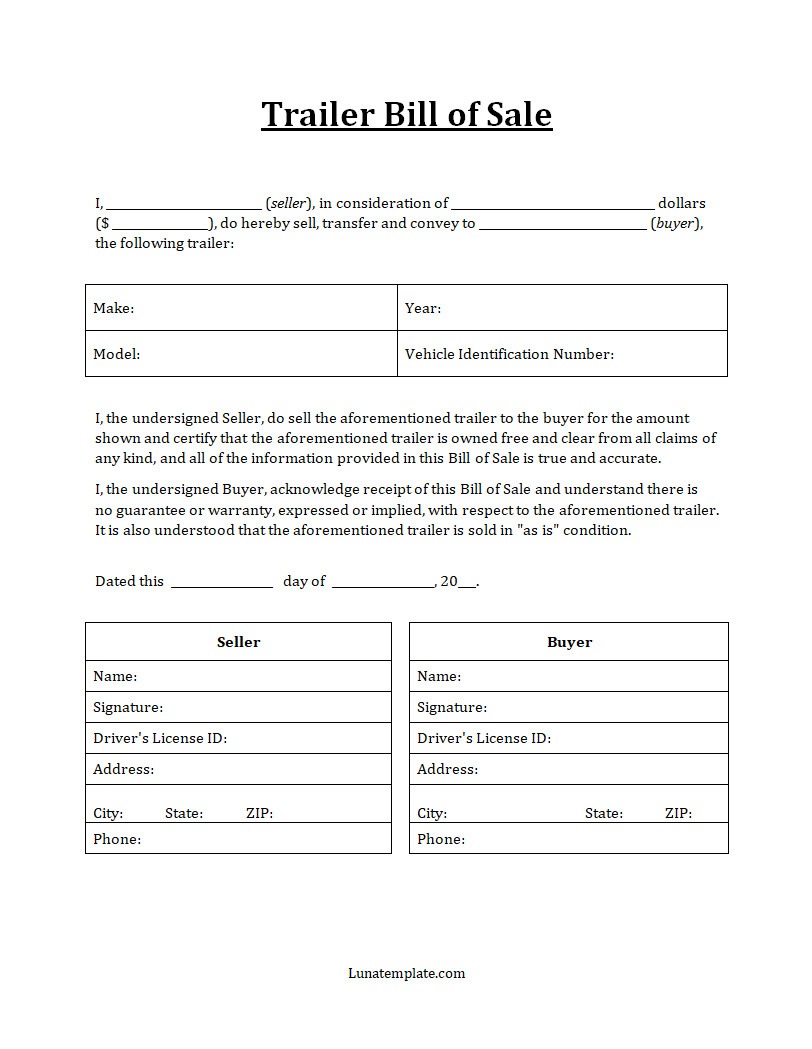A trailer bill of sale is a legal document that serves as a contract to document the sale of a trailer and outline the transfer of ownership from the seller to the buyer. It is a crucial document that allows both parties to understand their rights and responsibilities, and acknowledge that payment for the trailer has been made in full.
Additionally, it establishes that the buyer accepts the trailer in its current condition.
What is the difference between a bill of sale and a receipt?
While a bill of sale and a receipt may seem similar, they serve different purposes. A bill of sale is a legal document used to transfer ownership of a trailer from the seller to the buyer, while a receipt is a proof of payment for the transaction.
A bill of sale includes specific details about the trailer, such as its make, model, year, vehicle identification number (VIN), and any existing liens or encumbrances.

Purpose of a Bill of Sale
The primary purpose of a trailer bill of sale is to protect the interests of both the buyer and the seller. By documenting the transaction, it provides legal proof of ownership transfer, preventing disputes in the future.
A bill of sale outlines the terms and conditions of the sale, including any warranties, guarantees, or disclaimers. It also serves as evidence that the buyer has accepted the trailer in its current condition, without any future claims against the seller for undisclosed defects or damages.
How to Create a Comprehensive Bill of Sale for Trailers
When creating a comprehensive bill of sale for a trailer, it is essential to include specific information to ensure its validity and enforceability.
Here are some key elements to include:
1. Identification Details
Include the full legal names, addresses, and contact information of both the buyer and the seller. It is also important to include the trailer’s make, model, year, VIN, and license plate number, if applicable.
2. Purchase Price and Payment Terms
Specify the agreed-upon purchase price for the trailer and outline the payment terms, such as whether it will be paid in full upfront or in installments. If installment payments are involved, include the due dates and any penalties for late payments.
3. Trailer Condition and Disclaimers
Describe the current condition of the trailer, including any defects or damages, to ensure that the buyer is aware of its condition before purchasing. It is also advisable to include disclaimers stating that the trailer is sold “as is” without any warranties unless otherwise stated.
4. Liens and Encumbrances
If there are any existing liens or encumbrances on the trailer, disclose them in the bill of sale. This protects the buyer from assuming any outstanding debts or legal issues associated with the trailer.
5. Signatures and Witnesses
Both the buyer and the seller should sign the bill of sale to indicate their agreement to the terms and conditions. If possible, have the signatures notarized to add an extra layer of authenticity and legality to the document. It is also helpful to have one or two witnesses present during the signing.
6. Copies for Both Parties
Make sure to provide copies of the bill of sale to both the buyer and the seller. Each party should retain a copy for their records as proof of the transaction.
7. State-Specific Requirements
Be aware of any state-specific requirements for creating a bill of sale. Some states may have specific forms or additional information that needs to be included. Research the laws in your state or consult with a legal professional to ensure compliance.
Do I need to Get a Trailer Bill of Sale Notarized?
While notarization is not always required for a trailer bill of sale to be legally binding, it is highly recommended. Getting the bill of sale notarized adds an extra layer of authenticity and credibility to the document. Notarization also helps prevent fraudulent transactions and provides a stronger legal standing in case of any disputes in the future.
Conclusion
Whether you are buying or selling a trailer, having a trailer bill of sale is crucial to protect your interests and ensure a smooth transaction. It serves as a legal contract documenting the sale, outlining the transfer of ownership, and establishing the condition of the trailer.
By following the guidelines mentioned above, you can create a comprehensive bill of sale that protects both parties and provides peace of mind.
Trailer Bill of Sale Template – Word